- Home
- Belva Plain
Daybreak Page 10
Daybreak Read online
Page 10
A delicate flush spread over Timmy’s face. He glanced at his mother, then at Bud and Tom, finally back to his mother, and replied softly, “I think some of the things I’ve read, some of the things Johnson says, sound awfully mean. And Betty Lee told me he hates black people.”
“With all respect to Betty Lee,” Bud objected, “and we all love her, but I really don’t think she has studied the issues enough to make a judgment. Naturally she listens to propaganda. It’s not her fault, I understand that, but she’s simply thinking what she’s told to think.”
“But people can always tell when other people hate them. And she’s black, Dad, so she can feel it better than we can when somebody hates blacks. At least,” Timmy said, suddenly reluctant, as if he had dared too much, as if he had felt some sharpness in Bud’s objection, “at least that’s what I think.”
Deeply moved, Laura said, “Timmy’s right. I see a terrible meanness here, too. This is an ugly election, and it frightens me.”
“Well, I just don’t know, Laura,” said Cecile. “It seems to me you need a man like Johnson in this state. An educated man, we all agree, well-spoken—”
“That’s just the danger, Aunt Cecile, he’s so well-spoken and so well educated that he can talk convincingly before whatever audience he happens to be addressing at the moment. And when Johnson speaks against the Klan, it’s only a mask for the kind of thing I witnessed yesterday, pain and hate and eventually, blood on the pavement. Nazi Germany. They started small, and look how they grew.”
Tom objected. “You know something, Mom? You and millions more have been awfully hoodwinked. The whole story is a great put-up job.” He spoke very patiently and very reasonably. “There never were any gas ovens, now that you mention Nazi Germany. There never were six million dead. Yes, there were camps and prisons where criminals, communist spies, and agitators were held, and they deserved to be. The rest is propaganda. Jewish propaganda.”
“Right on!” Bud cried. “It’s all a swindle, the whole blasted thing.”
Laura felt the hot blood rising to her face, and she cried out.
“The Holocaust a ‘swindle’! You dare to say that? When there are photographs in official German records, when there are eyewitness accounts by survivors and, yes, by American soldiers, too! When Eisenhower himself wept when he saw the human wreckage! As well say there never was a George Washington if you’re going to deny history!”
“Ahh,” Bud said, “you’re always defending Jews. And why, I can’t fathom. What do you know about them? How many do you even know?”
“What difference does it make whether I’m acquainted with them or not? But as it happens I have some darn good friends, girls I grew up with from kindergarten on. And I probably know more without being aware of it. I don’t make a practice of asking people about their religion or their ancestry.” Her own righteous indignation was making her vehement and proud. “I only want everybody to be treated decently and fairly. Isn’t that what religion is all about? We go to church on Sunday, don’t we? And it seems to me that what we hear there—”
No one responded. They were all looking at the empty air. In their code of behavior, the dinner table was no place for such vehement outbursts. It made the aunts uncomfortable. But she had not intended to be so emotional, so angry; her voice had simply risen, and without intending to, she had pushed her chair back from the table, clutching the edge with both hands. The events of yesterday must have affected her even more than she had realized. And she glanced at the faces, all of which, excepting Timmy’s, seemed to have closed up.
A weariness drained through her body so that she relaxed her hands and dropped her eyes to her plate. No one understood; Bud and the aunts were one. “Fine women,” he always said of them, and so they were. “A good man,” they had said of him from the very beginning, and so he was. Yet when it came to something as deep as how a person felt about the world and what kind of world was building, a curtain fell that isolated her from the good man and the fine women. As for Tom, it seemed as if a curtain was about to fall before him, too … Or maybe not … She felt alone at the table.
Lillian spoke first. “I take it then that you’ll be voting for Mackenzie, Laura.”
She came to. “Yes, I think he’s a decent, reasonable man.”
“Silver spoon. Georgetown Law. Johnson’s more of a self-made man.”
And where’s the sense in that? thought Laura. Who is Lillian to object to a silver spoon? It was absurd.
“We met Mackenzie,” Clem said. “Did Cecile tell you? He was at a dinner party last winter when we went to Captiva. People found him very likable, very bright.” He chuckled. “The women went for him in a big way. Thirty-seven, single, nice head of red hair—why not?”
Clem had neatly turned the conversation away from sober disagreement and Cecile would be grateful for that. They were well matched.
Laura jumped up. “The dessert’s a chocolate soufflé, and it’s ready just about now. Excuse me, I’m going to take it out of the oven, and then you’ll have to eat it right away before it starts to collapse.”
“Whipped cream with it, Mom?” asked Tom.
“Better than that. A great vanilla sauce. Help me clear the table, boys. No, Cecile and Lillian, you sit.”
The atmosphere of celebration that had begun the day was now subtly diluted. It was like a time when you are absorbed in a pleasure, a mood of untroubled ease on a day when the world is vivid all around you, and then, abruptly, something startles, a reminder that you do, after all, have a nagging, lurking trouble. And now the topics at the table had changed the atmosphere, had tainted it.
“No more politics,” Bud declared, when Laura came back bearing the souffle in its bubble-glass bowl. And when she gave him a look of gratitude, he continued, “We aren’t the only couple who cancel out each other’s vote. Clem, shall I fill your glass again? This is a great dessert wine. Tom, too, now that you’re nineteen?” He laughed, giving Tom his familiar wink. “It’s nice to pretend you guys never drink at college, right? Oh, I remember.”
Remarkable, thought Laura a few minutes later, how food can soothe. The soufflé, the wine, the coffee, the cheese and fruit, had spread contentment where only a short while before there had been polite hostility.
The evening ended early. Clem apologized, “We’ve had a long day, a long drive. I think we need to turn in.”
“It always feels funny,” said Lillian, “to come back and sleep in the house where you were born. It’s as if you’d never been away. But I hate to walk out on your evening, Bud.”
“Not mine. I have to go downtown, anyway. I’ve a meeting.”
“What? On Sunday night?” asked Clem, who for all his punctilious manners tended to be curious.
“Always something, Clem. I’ve had emergencies on Saturdays, too. When you’re on a couple of executive committees, Rotary, Chamber of Commerce, Lions—you name it—you can be out every night of the week if you want to. Except, I don’t want to. I keep it to a minimum. Tonight, though, I have to go. Really important business tonight. So I’ll see you folks in the morning.”
The boys, sitting with Laura on the back terrace, kept their voices low out of consideration for the guests in the bedrooms just above them.
And Laura’s eyes went to Tom, watching and wondering—those ideas of his, those shocking remarks about the Nazis: who had implanted them? He had mentioned the crowd he “went around” with. And she reflected, knowing fully that every parent did the same, on the influences that might be shaping the son or daughter who has left home as a familiar person and has become, in a measure, a stranger.
But did Tom not really choose those influences? At every university there is a variety of groups, a choice. So to a certain extent the foundation was laid before he left home. Yes. Face it, Laura, it was laid here by Bud. With a hundred little nods, winks, defenses, remarks and jokes—mean jokes—he has made himself quite clear. He has created an atmosphere, and Tom has breathed it in.
&nbs
p; What a pity! The fine mind, the sensitivity, corrupted and led astray—
Tom broke into her thoughts. “Look. The polestar.”
“Where?” asked Timmy.
“There, see?” Tom pointed. “Another name is the North Star. That’s how sailors first learned to know what direction they were going in.”
“Wagner’s Tale Evening Star.’ ” Laura hummed a phrase. “So fair and mild.”
“It’s the only star that doesn’t move. All the rest turn around it counterclockwise in twenty-four hours. Once you start learning even a little bit about the sky, you get hooked,” said Tom. “You have to know more. I took astronomy last semester, did I tell you? It was only elementary, of course, so I want to go on with more. That means I’ll have to take more math, too.”
How can such an intellect fall for the garbage that was spoken tonight? she asked herself.
At the same time she spoke pleasantly, sociably. “I’m never any good at finding my way around the night sky.”
“Look there!” Tom cried. “See that shape, Timmy? Follow my hand. Count seven stars—doesn’t that look like a bear? It’s Ursa Major, the Big Bear. And over there. Watch my finger pointing, see? Count seven stars again. That’s Ursa Minor, the Little Bear. You know what boggles my mind about all this stuff? The precision. That’s what I marvel at. It’s all so precisely ordered. Regular and perfect. No confusion. Look at meteors, for instance. Isn’t it amazing that you can predict their arrival? On August twelfth, maybe a few days before or after, but anyway, around then we’re going to see a shower of meteors. You and I’ll come out here, Timmy, and watch. Then on the fifteenth of November, there’ll be another shower in the morning; can you believe it? They even know what time of day it’ll be. Fantastic!”
Timmy stirred. “My stomach feels awful, Mom,” he murmured.
She sat up instantly. “Is it pain or nausea?”
“Just sick. Maybe I’m going to throw up. I don’t think so, though.”
“He ate too much rich stuff tonight,” Tom said. “The gravy, the chocolate and the cream sauce.”
“Go on up and get into bed. Then I’ll come and give you your medicine.”
Tom intervened. “I’ll go, Mom. You worked all day. Besides, Tim knows what medicine to take. Come on, kid, you and Earl. We’ve got a lot of talking to catch up on, anyhow.”
Upstairs Tim began his familiar distressful, choking cough. From long experience Tom knew at once that there was a connection between the nausea and mucus-laden cough. And he knew what to do.
The shallow pan hung near the stove, milk was of course in the refrigerator and honey in the jar on the shelf. And as he stood watching the pan, he had a frightening vision of that intensive care unit on the seventh floor where the family had already had to watch and wait; you turned right at the elevator …
He shuddered and went upstairs with the milk.
“Drink it slowly, it’ll soothe,” he said, as if Tim didn’t know all that.
And he sat down to watch his brother, to wait as the coughing gradually subsided. The two hands that grasped the tumbler were so delicate. Such a thin little guy, no doubt the smallest kid in his class. How that must hurt! And how, in a perverse way, it must hurt that nobody teased him, nobody ever called him “shorty” or “shrimp” because their parents had told them that he was very sick and they must treat him kindly.
“My coughing bothers Earl,” Timmy said, for the dog, sitting upright at the foot of the bed, was turning a quizzical, bright look from Timmy to Tom in turn. “Do you know he’s my best friend, not counting you, Tom?”
“I’m your brother. That’s even more than a best friend.”
“I know.” Having finished the milk, Tim clasped his hands around his knees and regarded Tom intently, giving the latter to understand that he expected a cozy bedtime talk. “Have you got a girl, Tom?”
“Well, yes, in a way, and also no. I mean, in college you get to meet lots of girls. In classes and at dances and football games, I mean. So you have one for a month or a couple of weeks with another—you know.” The kid would talk, and he didn’t want to be questioned about Robbie, didn’t, as a matter of fact, want to be questioned about anyone. “I guess I don’t have any special one right now.”
“You ought to have, Tom, it’s nice.”
“Yes? How do you know?”
Timmy, with a glance at the open door, leaned forward to whisper. “Because I have one. I’ll tell you if you promise not to tell.”
“I promise,” Tom said solemnly.
“Her name’s Mary Beth. I always have lunch at her table. Do you know why?”
“No. Why?”
“Because she asks me. Every day she asks me.”
“She has good taste. I’ll bet she’s pretty.”
“Yeah. She’s the prettiest girl in the class. She’s cool, Tom.”
“What color hair has she got?”
“Sort of brown. Light brown with some yellow in it. She wears cool clothes, too.”
“I’d sure like to meet her, Tim.”
“Well, maybe you can if you’ll drive me to a sixth-grade party some night. Dad or Mom always do it, but you can if you want to.”
“I certainly want to.”
That little face, that peaked, earnest little face with the wistful eyes! He has Mom’s eyes, Tom saw. He hadn’t ever noticed before. They were both so dreamy, Tim and Mom, as if they were thinking of something far off, even while they were talking to you. On the other hand, people always said he himself looked like Mom and like her father.
Tim yawned, yet still kept talking. He didn’t want Tom to leave the room, that was why. “Dad got me a new Walkman. Want to see it?”
“Hey,” Tom said, “look at the clock. I’d rather sleep now, and then tomorrow we can have the whole day. You’ll show me the Walkman and we’ll do stuff together. Okay?”
“Okay,” Tim said.
“You’re feeling all right now, aren’t you?”
“Okay.”
The smile, Tom thought, is like a 150-watt bulb coming on in a dark hall.
“See you tomorrow, kid.”
Back in his own room he sat up in bed reading The Protocols of the Elders of Zion. It was a very old book, Robbie had told him, but it was constantly being reprinted and recirculated throughout the world because what it said was still true.
From every country, it said, the Jews sent representatives, old clever men, their most experienced, to a secret place, so secret that no one had yet been able to discover where it was, and there they hatched their plans to dominate the planet.
Tom hesitated. Well, maybe so … After all, you had to look at what these people owned in this city alone! The department store in the heart of town was Jewish. So were half the shops in the new mall, the stores where he bought his shoes and his suits, the sporting goods chain, the jewelry store where Mom bought the watch for his graduation. Yes, and at the cardiology department in the hospital where Aunt Lillian had her operation last year, the head was Jewish. Everywhere you looked, you came across these people living like princes.
This book was eloquent, powerful in driving home the facts. People were too slow to recognize the facts, that their world was changing.
Dad knew it, though. But Dad had to be discreet. He had a living to make, this family to provide for, and the way they lived, it must cost plenty. They lived well, with the best of everything, and Dad couldn’t afford to make enemies. Besides, he wanted to keep peace at home. Mom definitely was a bleeding heart, and there was no use arguing with her. And Dad loved her. He didn’t want to upset her. She was an innocent, a gentle innocent, all wrapped up in her books, her piano pupils, and of course the family.
He looked around his room to savor the feel of it before turning out the light. Mom had put a single red rose in a vase on his desk. It touched him to look at that plump rose. She had been wanting him to come home, looking forward to him when she went into the garden to cut it.
“I shouldn’
t have said what I did at dinner today,” he told himself, feeling regret. “It was mean to upset her.”
His eyes roved farther. Maybe he ought to hide all the stuff that bothered her, the books on Hitler, even the photograph of Jim Johnson. What difference to his conviction did it make whether those things were out on display or not? He could keep them all in the room where he slept so often with Robbie. There with her was his other life, his adult, independent life.
He stretched, easing every muscle and bone into the comfort of the bed. Something in the motion sent a voluptuous throb through his loins, bringing the instantaneous thrill of Robbie’s pneumatic body, hard in places, soft in places, resilient, as she clung.
Then, thinking, Timmy will almost certainly never know all that beauty, all that magic, the vivid throb subsided into sorrow, and he knew he must try to think of something else to lure himself into sleep and escape that sorrow.
Outside, the summer night was drowsy with the familiar sounds of insect life. Crickets were chirping as they had chirped for thousands of years. On some other planet, as it turned away from its own particular sun, some other kind of creature, according to the probabilities, must be awake in the darkness too. Scientists predict that, when catastrophe finally strikes down humankind on this planet of ours, only the insects will be left. Cockroaches? Ugh! Locusts, now, not too bad, although they do squawk and buzz. But crickets aren’t bad at all, with their chirp and trill. Chirp and trill all night outside my window …
He slept.
Left alone in the vacant darkness, Laura was still sitting with her thoughts when Bud’s car rolled up the driveway into the garage. The rear lights, two round red eyes, glared and closed as the garage door rumbled down. Bud’s feet swished on the grass and he came up on the veranda.
“Hey, what’s the trouble?”
“No trouble. Just sitting.”
“Sitting here alone. What is it?”
“Nothing, really.”
“I know your moods. You never fool me.”

 The Golden Cup
The Golden Cup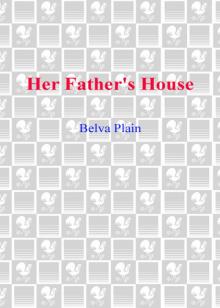 Her Father's House
Her Father's House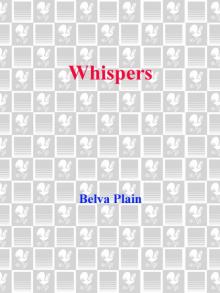 Whispers
Whispers Crescent City
Crescent City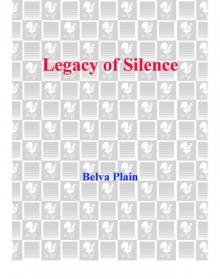 Legacy of Silence
Legacy of Silence Crossroads
Crossroads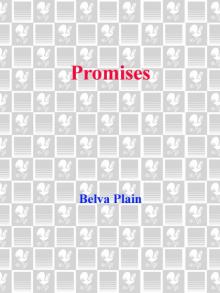 Promises
Promises After the Fire
After the Fire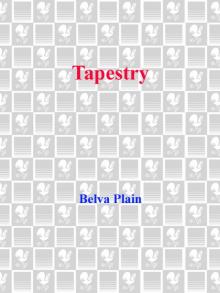 Tapestry
Tapestry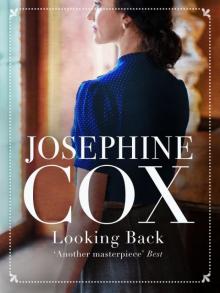 Looking Back
Looking Back Heartwood
Heartwood The Carousel
The Carousel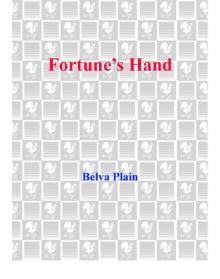 Fortune's Hand
Fortune's Hand Homecoming
Homecoming Random Winds
Random Winds Harvest
Harvest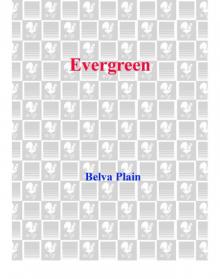 Evergreen
Evergreen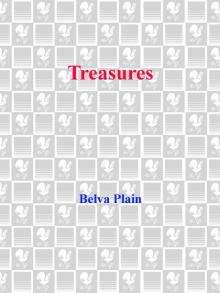 Treasures
Treasures The Sight of the Stars
The Sight of the Stars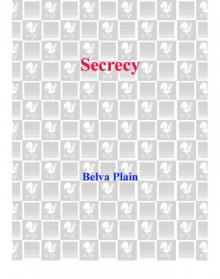 Secrecy
Secrecy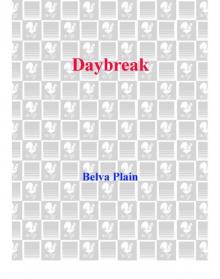 Daybreak
Daybreak Eden Burning
Eden Burning